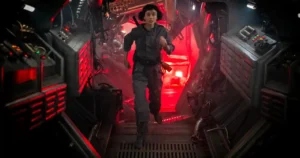Summary
Uprising does not hold back and I am so glad it didn’t. It’s a watch-worthy experience from start to finish. If you love Joseon Dynasty dramas, this is a treat.
Uprising is the kind of historical military film that you have to pay attention to. Cue the costume designs, which we already expect to be brilliant in this industry (as it’s South Korean, after all), and the rich context of the Joseon Dynasty, and we have a rousing film in our hands. Not only was I taken aback by this feature, which starred Gang Dong-won and Park Jeong-min, but I also loved it. It is destined to be epic from the first minute it opens.
The story follows two friends who grew up together in the Joseon Dynasty. One was a master, and the other was a slave, but post-war, they became enemies on opposite sides after a Japanese invasion changed the entire country’s makeup. The innocence of childhood and the hardships of adulthood combine with ease, providing an emotional string to hold on to.
Uprising is quickly smart with the subject matter, especially with the historical context, which is well woven into the story. The film plays a role in the class system between lowmen, slaves, commoners, and noblemen. It’s a crux, if anything. Each character has a role in society, but the desire for friendship threads through as the story’s core.
(There’s also this knowing reality that the Joseon Dynasty and its social construct is unchangeable: a harsh reality for the characters).
For the most part, you yearn for Cheon-yeong (former slave) and Yi Jong-ryeo (former master) to find common ground in an almost impossible political landscape. If anything, the story of Cheon-yeong and Yi Jong-ryeo is a tragic friendship story. While Korean drama usually toils with romances, this movie instills two friends separated by class, unable to communicate with each other due to the times they live in.
Uprising relies heavily on war and military throughout, so fighting choreography is expected to be at the forefront of the feature; I was super impressed. The scenes involving one-on-one sword battles were pleasing to the eye and well-structured. The film does not hold back on the gore, but it’s not the spotlight of the spectacle. The horrific nature of war is more the salient point if anything.
There’s also an important message about power and war in Uprising. Regardless of class and status, people are needed when the country is in danger, but in the aftermath, greedy rulers lust for the status quo. There’s certainly a magnification of rulers, past and present, who deem social constructs as their tools, not the people’s, bringing the film a real sense of community in parts.
I will say, however, that Uprising is not suitable for a random watch. At times, I sensed that some viewers coming across this may need the time and space to consume it, which is why I did an entire movie recap that also explains the ending. This South Korean movie is not for the fainthearted, intellectually or otherwise. Allow the film to breathe, and you’ll be suitably rewarded. Trust me.



